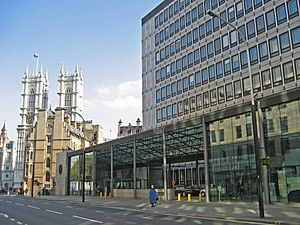- This page was last modified on 17 October 2025, at 10:18. Suggest an edit.
UK Trade & Investment facts for kids
 |
|
 |
|
| Non-ministerial government department overview | |
|---|---|
| Formed | October 2003 |
| Preceding Non-ministerial government department |
|
| Dissolved | July 2016 |
| Superseding agency |
|
| Jurisdiction | United Kingdom |
| Headquarters | 1 Victoria Street, London, SW1H 0ET |
| Employees | 2,331 |
| Annual budget | £270 million (2009-2010) |
UK Trade & Investment (UKTI) was a part of the UK Government. It helped businesses in the United Kingdom sell their products and services to other countries. It also encouraged companies from other countries to invest and set up businesses in the UK. UKTI stopped existing in July 2016 and was replaced by the Department for International Trade.
What Was UKTI?
UKTI was a government department that worked with businesses. Its main goal was to help UK companies succeed in markets around the world. It also worked to attract foreign companies to invest in the UK.
How UKTI Started
UKTI began in May 1999. It was first called British Trade International. This group had two main parts. One part, called Trade Partners UK, helped British companies sell things abroad. The other part, Invest UK, focused on getting foreign companies to invest in the UK.
In October 2003, these two parts and the main name joined together. They became UK Trade & Investment. This change made it simpler for people to understand what the organization did. It also helped avoid confusion between the different parts.
UKTI's Main Goals
UKTI had a clear purpose. It aimed to make companies in Britain more competitive. It did this by helping them with international trade and investments. UKTI also wanted to attract many high-quality foreign investments to the UK. This meant bringing in money and businesses from other countries.
How UKTI Was Organized
UK Trade & Investment was an international organization. Its main offices were in London and Glasgow, Scotland. Around the world, UKTI had about 2,400 staff members and advisors. These people worked in British Embassies, High Commissions, Consulates, and trade offices.
In England, UKTI also had regional offices. Some of its services were handled by other organizations. For example, in parts of England like Devon, Cornwall, and Somerset, a company called Serco provided these services. In China, the China Britain Business Council helped deliver UKTI's work.
Leaders from businesses and universities also worked with UKTI. They were called "business ambassadors." They helped promote the UK globally. They also looked for new trade and investment chances. They especially focused on helping small and medium-sized businesses (SMEs).
UK Trade & Investment brought together work from two other government departments. These were the Foreign & Commonwealth Office and the Department for Business, Energy and Industrial Strategy. A special representative, the UK Special Representative for International Trade and Investment, also worked with UKTI. Their job was to promote British businesses and products.
UKTI also worked with private groups. For instance, it had agreements with the Federation of International Trade Associations. Through this, they shared market research and reports on GlobalTrade.net.
UK Trade & Investment had a special branch called UKTI DSO. This part helped UK companies that make defense and security products sell them to other countries.
See also
- Economy of the United Kingdom
- Free trade agreements of the United Kingdom
